|
|
|
Sort Order |
|
|
|
Items / Page
|
|
|
|
|
|
|
| Srl | Item |
| 1 |
ID:
115095
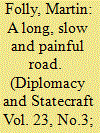

|
|
|
|
|
| Publication |
2012.
|
| Summary/Abstract |
The Second World War Anglo-American alliance was less cohesive on the political side than the military. There were widening divergences between Britain and the United States with regard to the best way to handle co-operation with the Soviet Union during 1944. Some shared assumptions about the motivations of Soviet policy existed, but British and American policy-makers not only formulated different approaches, they consistently viewed their own to be more successful than those of their ally. There was an opportunity to co-ordinate polices during American Under-Secretary of State Edward Stettinius's mission to London in April 1944 but the fact that the issue was barely discussed is symptomatic of the situation. The British Foreign Office gained the backing of Winston Churchill in an attempt to forge ahead with pragmatic arrangements with the Russians. A satisfaction with their own efforts on both sides meant that the British and American bureaucracies made no serious and sustained attempt to co-ordinate their policies towards the Soviet Union through 1944, in contrast to the closeness of co-operation in other areas.
|
|
|
|
|
|
|
|
|
|
|
|
|
|
|
|
| 2 |
ID:
112820
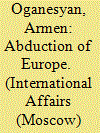

|
|
|
|
|
| Publication |
2012.
|
| Summary/Abstract |
WE ARE WATCHING the "abduction of Europe": the European dream of many generations of great European politicians is melting away. It was immediately after the war that Robert Schuman, Jean Monnet, Winston Churchill, Charles de Gaulle, Konrad Adenauer, Paul-Henri Spaak and many others laid the ideological foundation of united Europe. In 1962, Harold Macmillan disappointed his audience by saying to the EEC prime ministers that his country was determined to integrate into Europe. The British primer was convinced that his country could look forward to economic growth only as part of a big continental bloc. Today, the British press has dismissed this as a superficial and short-sighted approach which nevertheless was accepted by the larger part of the establishment and which cost dearly to the nation. The Brits, however, are often pushed aside as an insular nation. Le Monde of France betrays its concern by asking "Will Europe repeat the history of the USSR?" It admits, with a great deal of bitterness, that the integration institutes and Euro-bureaucracy which have grown out of proportion "are treated in Europe at best with indifference or at worst are totally rejected."
|
|
|
|
|
|
|
|
|
|
|
|
|
|
|
|
| 3 |
ID:
133061
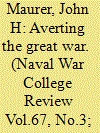

|
|
|
|
|
| Publication |
2014.
|
| Summary/Abstract |
Winston Churchill is best remembered as a valiant leader in times of war. He should also be remembered, however, for his efforts to prevent the catastrophic great wars that would scar the history of the twentieth century. While it is largely forgotten today, on the eve of the First World War Churchill made a remarkable attempt to halt the head-to-head competition in naval armaments that was setting Great Britain and Germany against one another as adversaries. In a bold and unconventional initiative, Churchill invited Germany's rulers to take a "holiday" from the competitive building of battleships. As the civilian head of Britain's Royal Navy, Churchill made public appeals for a naval holiday on three separate occasions before 1914. Behind the scenes too he pressed for the opening of negotiations with Germany, using the holiday proposal as the starting point for discussions. It was Churchill's earnest hope that the naval holiday would stop the action-reaction dynamic of the arms race-what statesmen of that era called "the sea war waged in the dockyards"-and reduce the antagonism between Britain and Germany. Rather than letting Britain and Germany be arrayed in opposing camps, he wanted to promote cooperation between Europe's two leading great powers.
|
|
|
|
|
|
|
|
|
|
|
|
|
|
|
|
| 4 |
ID:
162812
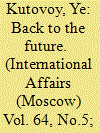

|
|
|
|
|
| Summary/Abstract |
Foreign policy of a great people is not arbitrary neither it is a game of chance; it takes shape for centuries according to the needs of this people and its ideas on what is useful.
|
|
|
|
|
|
|
|
|
|
|
|
|
|
|
|
| 5 |
ID:
132418
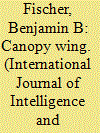

|
|
|
|
|
| Publication |
2014.
|
| Summary/Abstract |
Although Winston Churchill declared that history is always written by the victors, never the vanquished, a group of former East German foreign intelligence officers seem determined to prove him wrong. Calling themselves Insiders have been churning out books since the end of the Cold War that recount the history of that conflict from their perspective. The Insiders' mantra is that they were on the right, even if losing, side because they "spied for peace" to protect the Warsaw Pact against the existential threat posed by the "aggressive intentions" of the West.
|
|
|
|
|
|
|
|
|
|
|
|
|
|
|
|
| 6 |
ID:
130835
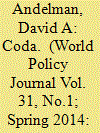

|
|
|
| 7 |
ID:
132411
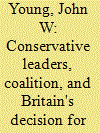

|
|
|
|
|
| Publication |
2014.
|
| Summary/Abstract |
Conservative leaders may have had a decisive impact on the decision by the Liberal government to enter the Great War in August 1914. In a seminal article of 1975, Keith Wilson argued that their readiness to fight "cut the ground … from beneath the feet of the non-interventionists" in the Cabinet. Those ministers who had hitherto opposed war now recognised that continued divisions could bring the government's collapse, in which case the Unionists, probably in a coalition with pro-war Liberals, would take office and enter the conflict anyway. Since Wilson's essay, important light has focussed on Unionist thinking by works that look at the July Crisis as part of a longer party history. This analysis provides a detailed investigation of the actions of Unionist leaders in the days immediately leading to war. It resolves some of the main contradictions in the primary evidence, argues that the possibility of a coalition was very real and demonstrates that one key player-the first lord of the Admiralty, Winston Churchill-subsequently tried, with some success, to disguise his activities.
|
|
|
|
|
|
|
|
|
|
|
|
|
|
|
|
| 8 |
ID:
102747
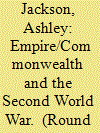

|
|
|
|
|
| Publication |
2011.
|
| Summary/Abstract |
The whole British Empire was involved in the Second World War from its outset. This article challenges the myth of Britain 'alone' against Hitler; one-fifth of the world's population was at war because Britain was. Britain called on vast colonial resources to defend a global empire and global trade. The importance of the African continent has been overlooked, but Africa experienced a large range of military activities by land, sea and air and personnel from all over the Empire served there.
|
|
|
|
|
|
|
|
|
|
|
|
|
|
|
|
| 9 |
ID:
128908
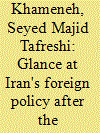

|
|
|
| 10 |
ID:
116359
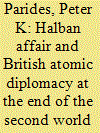

|
|
|
|
|
| Publication |
2012.
|
| Summary/Abstract |
In winter 1944, Sir John Anderson, senior minister in the government of Winston Churchill, and Wallace Akers, the chief executive officer of Imperial Chemical Industries, tried to initiate an independent and secretive atomic diplomacy that aimed to repair the Anglo-French atomic relationship. At the centre of this diplomatic debacle was a meeting in Paris between Hans Von Halban and Frédéric Joliot. Halban also travelled to Montreal at the behest of Anderson and Akers to ensure the continuation of Anglo-French atomic co-operation. Their actions not only failed to achieve their intended goal; they also brought about the unintended consequence of straining the Anglo-American atomic alliance and exacerbating France's bitterness at the Allies' refusal to invite France into their atomic alliance. This analysis is significant because it sheds light on the understudied area of British atomic diplomacy and increases the understanding of the Anglo-American "special relationship."
|
|
|
|
|
|
|
|
|
|
|
|
|
|
|
|
| 11 |
ID:
134059
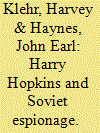

|
|
|
|
|
| Publication |
2014.
|
| Summary/Abstract |
One of the intriguing unidentified cover names in the Venona decryptions released in the mid-1990s was '19', a Soviet source senior enough to report taking part in a conversation with President Roosevelt, Prime Minister Churchill, and Vice-President Wallace at the 1943 Trident conference. While some historians thought the evidence too ambiguous to identify the real name behind '19', others built a case that it was presidential adviser Harry Hopkins. Alexander Vassiliev's notebooks, made public in 2009, resolved the issue by firmly identifying '19' as State Department official Laurence Duggan. There remain, however, writers who refuse to accept the evidence that '19' was Duggan and insist that Hopkins was a Soviet agent on the basis of insubstantial evidence.
|
|
|
|
|
|
|
|
|
|
|
|
|
|
|
|
| 12 |
ID:
133419
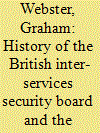

|
|
|
|
|
| Publication |
2014.
|
| Summary/Abstract |
During the Second World War there was an increasingly developed system for controlling the code-names used for operations where different Allied forces were involved. This paper follows the development of this system - based on the British Inter-Services Security Board - that spread to overseas theatres on the British side and to American forces world-wide. The selection of code-names was not without controversy; with Winston Churchill getting personally involved and his intervention is highlighted. A critique of the system is attempted, although the final judge is ultimately the success of the security of the activities disguised by the code-names.
|
|
|
|
|
|
|
|
|
|
|
|
|
|
|
|
| 13 |
ID:
127243
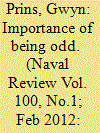

|
|
|
| 14 |
ID:
097678
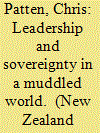

|
|
|
| 15 |
ID:
093748
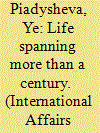

|
|
|
|
|
| Publication |
2009.
|
| Summary/Abstract |
It is an exceptional thing when a person lives for a hundred years. And Dmitry Fyodorovich's whole life, a bright and highly-charged pageant of events and activities, which has spanned a century, has been exceptional.
Right after the war, engineer Safonov was recruited into the diplomatic service. He did not have to wait long to find himself in the thick of things. In 1946, he, along with his family, went to work at the UN Secretariat as a foreign civil servant. Everything was new, unfamiliar, for the first time. And not only for him and his family: the life of a vast international structure was being formed and organized.
|
|
|
|
|
|
|
|
|
|
|
|
|
|
|
|
| 16 |
ID:
023800
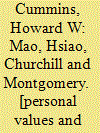

|
|
|
|
|
| Publication |
London, Sage Publications, 1973.
|
| Description |
63p.Pbk
|
| Series |
International studies vol.2, no.02-021
|
| Standard Number |
0803903731
|
|
|
|
|
|
|
|
|
|
|
|
Copies: C:1/I:0,R:0,Q:0
Circulation
| Accession# | Call# | Current Location | Status | Policy | Location |
| 016125 | 923.2/CUM 016125 | Main | On Shelf | General | |
|
|
|
|
| 17 |
ID:
103110
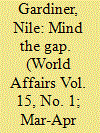

|
|
|
| 18 |
ID:
106710
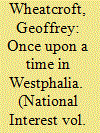

|
|
|
|
|
| Publication |
2011.
|
| Summary/Abstract |
FOR GOD'S sake do not drag me into another war," said the Reverend Sydney Smith in 1823.
I am sorry for the Spaniards-I am sorry for the Greeks-I deplore the fate of the Jews; the people of the Sandwich Islands are groaning under the most detestable tyranny; Bagdad is oppressed . . . Thibet is not comfortable. . . . The world is bursting with sin and sorrow. . . . Am I . . . to be eternally raising fleets and armies to make all men good and happy?
|
|
|
|
|
|
|
|
|
|
|
|
|
|
|
|
| 19 |
ID:
048698
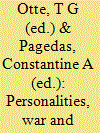

|
|
|
|
|
| Publication |
London, Frank Cass Publishers, 1997.
|
| Description |
xii, 291p.Hbk
|
| Standard Number |
0714648183
|
|
|
|
|
|
|
|
|
|
|
|
Copies: C:1/I:0,R:0,Q:0
Circulation
| Accession# | Call# | Current Location | Status | Policy | Location |
| 039445 | 909.8/OTT 039445 | Main | On Shelf | General | |
|
|
|
|
| 20 |
ID:
023785
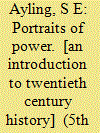

|
|
|
|
|
| Edition |
5th ed.
|
| Publication |
London, George G Harrap and Co. Ltd., 1971.
|
| Description |
432p.Hbk
|
| Standard Number |
0245506608
|
|
|
|
|
|
|
|
|
|
|
|
Copies: C:1/I:0,R:0,Q:0
Circulation
| Accession# | Call# | Current Location | Status | Policy | Location |
| 007885 | 909.82/AYL 007885 | Main | On Shelf | General | |
|
|
|
|
|
|
|
|
|